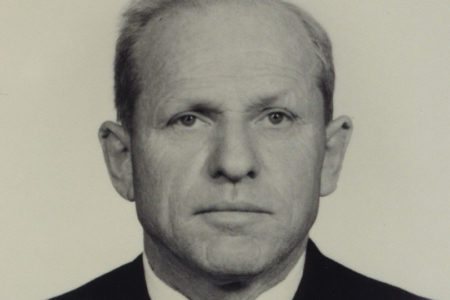The Incomparable Christ
Hebrews 1:1–3
Hebrews is without question one of the greatest and most important books in the New Testament. In it the writer presented an in-depth study of both the deity and humanity of Jesus the Messiah, covering His earthly ministry to His exaltation at the right hand of God Almighty. This epistle explains the excellencies of Christ in His person, priesthood, preeminence, and purpose for coming to Earth.
The book’s human author is unknown and has been debated from the inception of postapostolic times. We do know, however, that he was Jewish and had a thorough knowledge of the Jewish culture and religion of his day. He addressed his epistle to a group of Jewish Christians whose exact location is unknown.
Nor is the date of authorship given, but it can be estimated with some certainty. Clement, the bishop of Rome, quoted from Hebrews, indicating the book had to be written before A.D. 95. Also, Timothy was still alive because he is mentioned in Hebrews 13:23.
The absence of any mention of the fall of Jerusalem or the end of the sacrificial system indicates Hebrews was written before the Temple was destroyed in A.D. 70. Nero implemented an empirewide persecution of Christians in A.D. 64. This could be the persecution mentioned in Hebrews 10:32–34, supporting an early date for the book. Given these facts, we date the writing of Hebrews between A.D. 64 and 67.
This epistle was written primarily to Jewish believers. First, some had dropped out of the Christian community. They had compromised their faith and were considering a return to Judaism (Heb. 10:23–25). Second, others were babes in the faith whom the writer was encouraging to go on to maturity in Christ (6:1–2).
In addressing the abandonment of their new faith, the author showed that Christ is better than what Judaism had to offer (1:4; 6:9; 7:7, 19, 22; 8:6; 9:23; 10:34; 11:16, 35, 40; 12:24). By contrast, he showed that Christ is superior to prophets, angels, Moses, Joshua, Aaron, Melchizedek, the Tabernacle, sacrifices, priesthood, and the Old Testament saints. In other words, the Old Testament prophecies of the Messiah were fulfilled in Jesus (cf. Lk. 24:27, 44).
Even today, the book of Hebrews reminds and convinces Jewish believers that Christ is superior to anything they had in Judaism and that He is sufficient for every area of their spiritual lives. In the first three verses, the writer provided irrefutable proof that Jesus Christ is God and heir of all things.
The Prophets’ Revelation
The writer wasted no time in making his point. Without any salutation, he immediately began setting forth the progression of God’s revelation through the prophets: “God, who at various times and in various ways spoke in time past to the fathers by the prophets” (Heb. 1:1).
All we know about God came directly from Him. If God had not spoken, humanity would have no clue as to His person, nature, character, creation, or will for mankind. Thus, over time, God progressively revealed Himself through the prophets who accurately recorded the revelation, revealing God and His will for humanity.
God did not set aside the prophets’ personalities, languages, and cultures when He providentially guided each to reveal His Word. All Scripture is God-breathed, infallible, inerrant, plenary, verbal, and confluent as originally given. As the very Word of God, Scripture possesses the properties of authority, sufficiency, clarity, and efficacy.
The revelation from God came at “various times and in various ways” to “the fathers” (v. 1). From the time of Adam to the prophet Malachi, God progressively revealed His plan, program, and purposes. God also spoke in “various ways” to the fathers (v. 1). Often He gave the revelation directly to men like Abraham, Moses, Isaiah, and Ezekiel. God also spoke to the prophets through dreams and visions. At other times He spoke through a storm, fire, or an audible voice. The Old Testament was inerrant truth from God, but it is not all the truth that God was to reveal to man. What was revealed in the Old Testament set the stage for unveiling the sufficiency and superiority of Jesus Christ, God’s Son. Four hundred years after the close of the Old Testament Scriptures, God would continue His revelation to mankind through Jesus Christ.
The Present Revelation
The revelation to the Old Testament prophets was only partial and periodic; the preeminent revelation was to come through Jesus Christ who would not only speak for God but as God Himself. The writer of Hebrews said succinctly that God “has in these last days spoken to us by His Son” (v. 2).
The phrase these last days (literally, “in the last of these days”) means the time in which God will terminate His revelation to man. The phrase was a common rabbinical reference denoting a Messianic period. When Jesus the Messiah came into the world, God—through Him—fully expressed the revelation of Himself and His Word to mankind. In other words, in the last days, the Messianic promises God gave the fathers in the Old Testament came to completion and fulfillment in and through Jesus the Messiah.
In the past, God spoke to mankind through the prophets; but now, in these Messianic times, God speaks exclusively “by Son.” (In the Greek, the word His is missing.) The absence of an article before the word Son speaks of the Son’s character and nature. In the past, God revealed Himself through prophets who were mere men; but Jesus the “Son” of God possesses the nature of deity and is the One through whom God is speaking in “these last days.”
The prophets spoke the Word of God, but the Son is both the Word of God and God (Jn. 1:1). Thus it is Jesus the Son who expresses the New Testament revelation of all that the Father is and wants revealed to mankind. The apostle John well said, “No one has seen God at any time. The only begotten Son [literally, “God”], who is in the bosom of the Father, He has declared Him” (v. 18).
God the Son, who is deity and equal with God the Father, has intimate fellowship with the Father because He is of the same nature as the Father. It is Jesus who has “declared [explains or exegetes] Him.” In other words, Jesus interprets and explains the works and the will of God the Father.
The Preeminent Revealer
The writer then set forth seven reasons why Jesus qualifies to be the final communicator of divine revelation and is infinitely superior to the prophets of old.
- He is Heir. God the Father “has appointed” Jesus Christ “heir of all things” (v. 2). It is only natural that He should become the heir if He is the Son. Behind heirship is the authority to be Lord over all the Father possesses (cf. Ps. 2:7–8). The “all things” include everything in the universe, both now and for eternity. Christ must be God in order to rule forever over the universe.
- He is Creator. It was through Christ that “He [God] made the worlds [ages]” (v. 2). The Son of God is presented as the mediating agency in creation, not as a mere instrument or passive tool, but a cooperating agent. The apostle Paul wrote, “For by Him all things were created….All things were created through Him and for Him” (Col. 1:16). This means that all the laws, plans, programs, and purposes that guide and govern the created universe through the “ages” reside in Christ—whether they were unfolded in the past or will be unfolded in the future. The times and ages began with Christ and will culminate in Him (Rev. 22:13).
- He Radiates God’s Glory. Christ is the “brightness of His [God’s] glory” (Heb. 1:3). The word brightness means “radiance” or “effulgence,” referring to a light shining or flashing forth from a luminous source. God the Son is the outshining of the divine glory and majesty of the triune God. Jesus does not simply reflect God’s glory; He possesses it. This fact is best seen at the Mount of Transfiguration when Jesus’ glory was unveiled to His disciples: “His face shone like the sun, and His clothes became as white as the light” (Mt. 17:2).
- He Represents God. Christ is the “express image of His [God’s] person” (Heb. 1:3). The phrase express image means “impression” or “stamp.” It refers to an engraved character or impression produced by a die or seal that makes an exact reproduction. Paul wrote, “He is the image of the invisible God” (Col. 1:15). Therefore, Christ is the exact imprint of God the Father in His essence, attributes, and character. By studying the Son, we are able to understand the invisible Father.
- He is Sustainer. Christ is “upholding all things by the word of His power” (Heb. 1:3). The Lord made all things and will inherit all things. He not only sustains the world but also moves all things that have been created toward the goal that was established for them. In other words, the world’s coherence is maintained by Christ who holds all things together and moves them in their proper relationship to one another by “the word [spoken word] of His power” (cf. Col. 1:17).
- He is Redeemer. Christ is the One who “by Himself purged our sins” (Heb. 1:3). This One who created the world, sustains the world, and will inherit the world also redeemed the world. All Jesus needed to do to create the universe was to speak it into existence. But to “purge our sins,” He had to go to the cross and die as our Redeemer and Sin-bearer. The Son’s ministry to provide purification from sin will become one of the major themes of this epistle. The work of redemption was accomplished totally by Christ, who gave Himself as a sacrifice for the purification of sin.
- He is Ruler. Christ is positioned at God’s right hand. Once He finished His work on the cross He “sat down at the right hand of the Majesty [God the Father] on high” (v. 3). This verse speaks of far more than the Son’s finished work of revealing God and redeeming mankind. It speaks of Christ being enthroned in a solemn, formal act to a position of honor, dignity, glory, and authority—which He possessed before creation. Being seated at the right hand of God the Father authenticates His coequal status as God.
What a picture of the incomparable Christ! It is self-evident that the Son’s person and work supersede and are superior to any revelation given by the prophets or found in Judaism. Each of these seven characteristics confirms the deity of Christ. This epistle was a strong reminder to Jewish believers who, because of persecution, were ready to abandon their new faith and return to Judaism.
Those who deny that Jesus is the divine Messiah are accusing God of being a liar and His Word of being a lie. God has said in His Word that both Jews and Gentiles must put faith in the Lord Jesus Christ, who is the only hope for man’s redemption. Have you?







